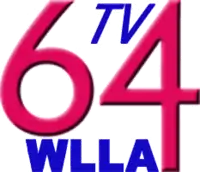WLLA
WLLA, virtual channel 64 (UHF digital channel 22), is a religious independent television station serving Grand Rapids, Michigan, United States that is licensed to Kalamazoo. Owned by Christian Faith Broadcast, Inc., it is a sister station to WGGN-TV in Sandusky, Ohio. WLLA's studios are located on East N Avenue in Kalamazoo, and its transmitter is located near Stewart Lake in Orangeville Township.
 | |
| Kalamazoo/Battle Creek/ Grand Rapids, Michigan United States | |
|---|---|
| City | Kalamazoo, Michigan |
| Channels | Digital: 22 (UHF) Virtual: 64 (PSIP) |
| Branding | WLLA |
| Slogan | West Michigan Family Television |
| Programming | |
| Affiliations | 64.1: Religious Independent 64.2: MeTV 64.3: Retro TV → Heroes & Icons (soon) 64.4: Decades 64.5: Retro TV (soon) |
| Ownership | |
| Owner | Christian Faith Broadcast, Inc. |
| History | |
First air date | June 30, 1987 |
Former channel number(s) | Analog: 64 (UHF, 1987–2008) Digital: 45 (UHF, until 2020) |
Call sign meaning | We Love KaLAmazoo |
| Technical information | |
Licensing authority | FCC |
| Facility ID | 11033 |
| ERP | 350 kW |
| HAAT | 330.8 m (1,085 ft) |
| Transmitter coordinates | 42°33′52.1″N 85°27′31″W |
| Links | |
Public license information | Profile LMS |
| Website | www |
History
The station signed on the air on June 30, 1987. In 2007, the station entered a revenue sharing agreement with long distance telephone carrier Accxx Communications.
Digital television
Digital channels
The station's digital signal is multiplexed:
| Channel | Video | Aspect | PSIP Short Name | Programming[1] |
|---|---|---|---|---|
| 64.1 | 1080i | 16:9 | WLLA-DT | Main WLLA programming |
| 64.2 | 720p | WLLA-D2 | MeTV | |
| 64.3 | 480i | 4:3 | WLLA-D3 | Retro TV → Heroes & Icons (soon) |
| 64.4 | 16:9 | Decades | ||
| 64.5 | 4:3 | Retro TV (soon) |
The station began carrying programming from MeTV on digital subchannel 64.2 on July 4, 2013.[2]
Analog-to-digital conversion
WLLA shut down its analog signal, over UHF channel 64, on November 1, 2008.[3] The station's digital signal remained on its pre-transition UHF channel 45, using PSIP to display the WLLA's virtual channel as 64 on digital television receivers, which was among the high band UHF channels (52–69) that were removed from broadcasting use as a result of the transition.
References
- RabbitEars TV Query for WLLA
- Me-TV Adds Seven New Affiliates, TVNewsCheck, April 5, 2013.
- List of Digital Full-Power Stations
External links
- Official website
- WLLA in the FCC's TV station database
- BIAfn's Media Web Database -- Information on WLLA-TV
- WLLA TV Channel 64 Kalamazoo. Michigan's Radio and TV Broadcast Guide.